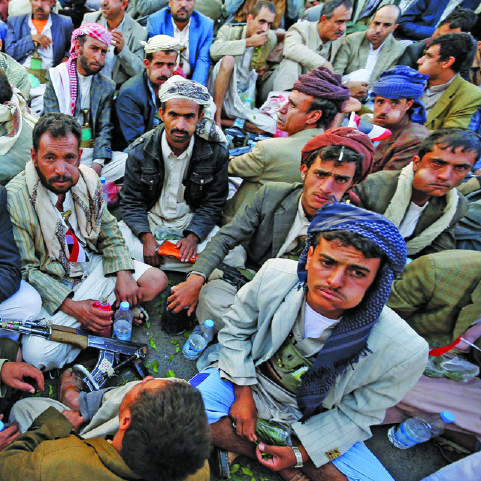Two years after the coup: What’s up with the Houthis
Dr. Theodore Karasik/Al Arabiya/September 23/16
Two years ago the Houthi’s launched their most recent uprising in what is called the 21 September Revolution, which ousted Yemeni President Abd Rabbuah Mansur Hadi last year. Since Hadi fled to the Kingdom of Saudi Arabia amid Houthi advances on Aden, Yemen’s chaos has continued unabated.
The Houthis and Saleh’s General People’s Congress (GPC) hold most of Yemen’s northern half, while forces working for the exiled government share control of the rest of the country with tribes. At least 10,000 people have been killed in Yemen’s 18-month-old civil war.
Several important factors explain why the Houthis are continuing to fight.
First, Houthi intransigence is killing the UN-sponsored talks to try to end 18 months of fighting in the southern Arabian Peninsula state. The negotiations between the sides collapsed in failure this month.
The talks ended abruptly after the Houthis and Saleh’s General People’s Congress (GPC) announced the formation of a ten-member governing council on August 6, ignoring a warning from UN Yemen Envoy Ould Cheikh Ahmed that such a move would violate UN Security Council resolutions on how to solve the conflict. Saudi Foreign Minister Adel Al-Jubeir stated that the Iran-backed Al Houthi militants would not be allowed to take over Yemen.
Houthis and forces loyal to ousted president Ali Abdullah Saleh intensified attacks into the southern Najran province. Houthi militias fired rockets targeting Saudi positions in Najran city in southern Saudi Arabia on August 16, killing at least seven civilians. The casualties included four Saudi nationals and three foreign nationals. Houthi forces fired a ballistic missile toward Najran city two days earlier on August 14, killing at least six people.
Second, is the Houthi relationship with the Islamic Republic of Iran. After the Houthi coup Iran stepped up support to Sana with supplies including missile parts and maintenance. A GCC official stated “Iran resupplies the Houthis on a regular basis despite attempts to block Tehran’s activity.”
The Assab Naval Base, used by the Kingdom and its allies, is critical in blockading the Houthi-held ports on the Red Sea and preventing Iran from resupplying the rebels. Clearly, this maritime solution is not 100 percent effective and thus more exposure of this network is necessary.
The recent wave of missile attacks against Saudi targets in the kingdom’s southern territory illustrates Tehran’s potential to maintain the Houthi forces’ means to bog the Saudis down on their southern border
Operation Decisive Storm
Of course, Saudi Arabia’s campaign against the Houthis and their allies has been ongoing since March 2015 when the Kingdom launched Operation Decisive Storm followed by the ongoing Operation Restore Hope. This multinational coalition led by Riyadh is making progress against the Houthis and their capital of Sana.
Military operations, combined with humanitarian aid to besieged parts of the country, is being used to achieve tactical and charitable goals. A notable achievement by the Kingdom and its allies was Operation Golden Arrow in August 2015, when pro-Hadi forces retook the strategic southern city of Aden from the Houthis.
Third, the Houthis are allowing al-Qaeda in the Arabian Peninsula (AQAP) and ISIS to thrive in Yemen by creating more chaos. While AQAP is engaged in fighting against the Houthis, ISIS is continuing to attack Yemen’s security forces and their recruits. A suicide car bombing targeting young army recruits in Aden killed some 71 people on August 29. ISIS took credit for the attack.
In addition, AQAP and ISIS are escalating their attacks in recent months, notably in the southern port city of Aden. The Houthi rebels and their allies are in the way of making progress against these extremist groups. There is no doubt, thanks to the Houthis, that AQAP and ISIS are trying to position themselves as the Sunni resistance to the Houthi rebel movement.
A key question is when will President Hadi return to power and what will the internationally-recognized Yemeni president’s GCC backers do to improve the prospects for his return to power? Having usurped de facto control of the capital last January, the longer the Houthis maintain their grip on Sana, the movement is putting forward a powerful message to their domestic and international foes that continued military bombardment will fail to eject their fighters from the country’s main northern city.
The Houthi delegation visit to Baghdad late last month for meetings with Iraqi Foreign Minister Ibrahim Jaafari and Islamic Supreme Council of Iraq Cleric Ammar al-Hakim is part of a wider, alarming campaign for finding regional support.
In addition, by continuing to arm the Houthis, Iran communicates to Riyadh that the Islamic Republic is capable of empowering its Shi’ite/Zaidi allies on the kingdom’s borders, threatening Saudi Arabia’s national interests, and consolidating its influence in Arab lands.
The recent wave of missile attacks against Saudi targets in the kingdom’s southern territory illustrates Tehran’s potential to maintain the Houthi forces’ means to bog the Saudis down on their southern border at a time when the Iranians are determined to distract Riyadh from the crises in Iraq and Syria in which the Islamic Republic’s stakes are actually much higher than they are in Yemen.
As the fluid, complicated and multifaceted conflict in Yemen continues to rage on the second anniversary of the Houthi’s successful uprising, it is worth questioning the Houthis’ agenda moving forward: Is Ansar Allah (the movement’s dominant militia) fighting to establish a Zaidi proto-state in northern Yemen along the Saudi border? Although appearing to be highly unrealistic, do the Houthis have a vision of one day ruling all of the war-torn country?
Regardless, until the Houthis lay down their arms and make concessions which they have not yet been willing to make based on offers from their adversaries, Saudi Arabia will continue its campaign in Yemen.




















